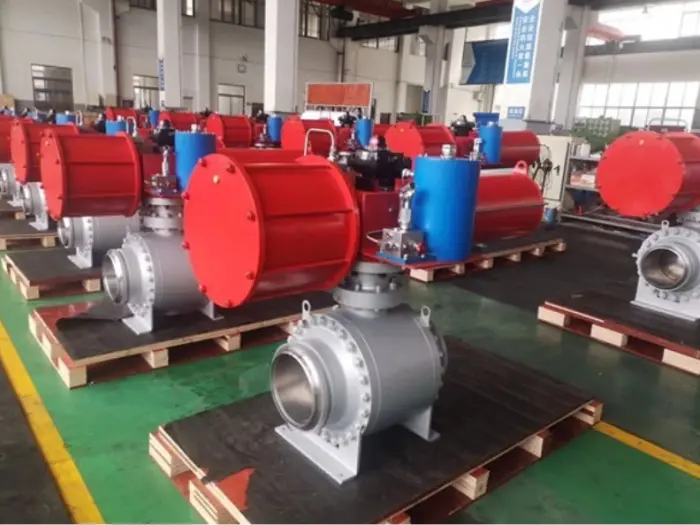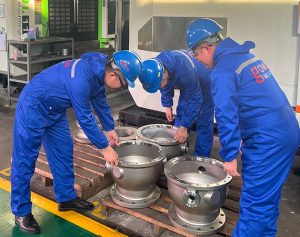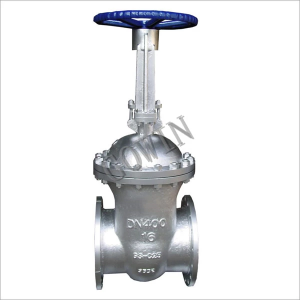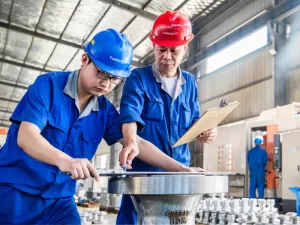A pneumatic ball valve is a type of valve that uses compressed air to control the flow of fluids through a spherical disc.
These valves are known for their reliability, durability, and precise control.
They are commonly used in various industrial applications due to their ability to provide quick and effective shut-off capabilities.
Pneumatic ball valves are an essential component in systems where automation and remote control are necessary.
Structure and Components of a Pneumatic Ball Valve
1: Body
The main structure of the valve houses all other components. It provides the framework and strength necessary to withstand the pressures and conditions of the fluid being controlled.
2: Ball
A spherical disc with a hole through the middle. When the ball’s hole aligns with the flow path, fluid can pass through; when turned, it blocks the flow.
3: Stem
The shaft connects the actuator to the ball, allowing the actuator to turn the ball and control the flow.
4: Actuator
A pneumatic device that uses compressed air to move the stem and ball. It can be either spring-return or double-acting, depending on the design and requirements.
5: Seats
Soft or hard rings that provide a seal between the ball and the body. They ensure a tight shut-off when the valve is closed.
6: Seals and Packing
Components that prevent leakage around the stem and other joints, ensuring the valve operates efficiently and safely.
7: End Connections
The points where the valve connects to the piping system, such as threaded, flanged, or welded connections.
What is the purpose of a pneumatic valve?
The primary purpose of a pneumatic valve is to control the flow of fluids (liquids or gases) using compressed air as the actuation source.
These valves allow for precise and reliable control, enabling automation in various industrial processes.
Pneumatic valves are preferred in environments where electrical actuation may pose a risk or where compressed air is readily available and can be harnessed efficiently.
Applications of Pneumatic Ball Valves
Pneumatic ball valves are widely used across various industries due to their versatility and efficiency. Some common applications include:
Oil and Gas
Purpose: Controlling the flow of crude oil, natural gas, and refined products. These valves are critical in upstream, midstream, and downstream operations, where reliable shut-off and control are essential to maintaining safety and efficiency.
Chemical Processing
Purpose: Managing the transfer and mixing of chemicals. Pneumatic ball valves are resistant to corrosive substances and can handle various chemical compounds, ensuring safe and accurate flow control in production processes.
Water Supply
Purpose: Regulating the flow in water treatment and distribution systems. They are used in both potable water systems and wastewater treatment plants, providing reliable service in controlling water flow and preventing leaks.
Power Generation
Purpose: Handling steam and cooling water in power plants. Pneumatic ball valves are integral in managing the flow of high-pressure steam and cooling systems, contributing to the efficient operation of turbines and other equipment.
Food and Beverage
Purpose: Ensuring sanitary conditions in processing and packaging. These valves meet strict sanitary standards, allowing for safe and contamination-free handling of food and beverage products during manufacturing processes.
Pharmaceuticals
Purpose: Controlling the flow of ingredients and finished products in a sterile environment. Pneumatic ball valves are used in the production of medicines and other health products, where maintaining a contaminant-free environment is crucial.
Advantages and Disadvantages of Pneumatic Ball Valves
Advantages
- Durability: Built to withstand high pressures and corrosive environments. The robust construction of pneumatic ball valves ensures long service life even under harsh operating conditions.
- Quick Operation: Rapid opening and closing, reducing response time in automated systems. This quick action minimizes downtime and improves the efficiency of industrial processes.
- Precise Control: Ability to provide accurate flow regulation. The design of pneumatic ball valves allows for fine-tuned control of fluid flow, which is essential in processes requiring high precision.
- Safety: Reduced risk of electrical hazards in explosive or wet environments. Since they operate using compressed air, pneumatic ball valves are ideal for use in environments where electrical sparks could pose a risk.
- Low Maintenance: Fewer moving parts and robust construction lead to reduced maintenance needs. The simple design of these valves means they are less prone to mechanical failures and easier to maintain compared to more complex valve types.
Disadvantages
- Initial Cost: Higher initial investment compared to some other valve types. The cost of pneumatic ball valves can be higher due to their materials and the complexity of the pneumatic actuator.
- Air Supply Dependence: Requires a continuous supply of compressed air to function. If the air supply is interrupted or insufficient, the valve may not operate correctly, potentially causing system failures.
- Size and Weight: Can be bulkier than manual valves, especially in larger sizes. The additional components required for pneumatic operation can make these valves larger and heavier, which may be a consideration in space-constrained installations.
Gowin: Trusted Pneumatic Ball Valve Manufacturer
Gowin is the premier valve manufacturing company that giant industries across the globe trust the most.
Your trusted valve manufacturer for oil & gas, chemical, metallurgy, power stations, water supply, and energy industries, Gowin offers a comprehensive range of ball valves, gate valves, globe valves, check valves, butterfly valves, plug valves, and needle valves.
Founded in 2007, Gowin consistently delivered top-tier valve products to industries in oil, gas, water, chemical, metallurgy, power, and energy for 16 solid years.
Over the years, Gowin has proven its excellent and outstanding performance in maintaining a professional relationship with its local and international clientele through the company’s reliable team that ensures quality service from start to finish.
Furthermore, Gowin is an ISO-certified (ISO9001 & ISO14001) valve manufacturing company in China with standard quality certifications, such as API6D, TS, OHSAS45001, Fire Safety API607 & API6FA.
Gowin’s commitment to quality and innovation has positioned it as a leader in the valve manufacturing industry, providing solutions that meet the highest standards of performance and reliability. Whether for critical applications in harsh environments or everyday industrial processes, Gowin’s valves are designed to deliver exceptional service and longevity.








